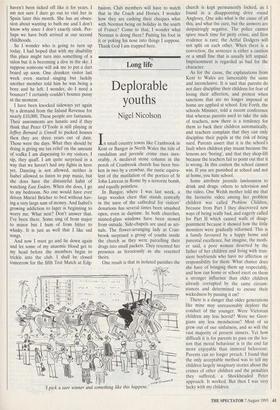Long life
Deplorable youths
Nigel Nicolson
In small country towns like Cranbrook in Kent or Bangor in North Wales the tide of vandalism and juvenile crime rises inex- orably. A medieval stone column in the porch of Cranbrook church has been bro- ken in two by a crowbar, the rustic equiva- lent of the mutilation of the portico of St John Lateran in Rome by a terrorist bomb, and equally pointless.
In Bangor, where I was last week, a large wooden chest that stands centrally in the nave of the cathedral for visitors' donations has several times been smashed open, even in daytime. In both churches, stained-glass windows have been stoned from outside. Side-chapels are used as uri- nals. The flower-arranging lady at Cran- brook surprised a group of youths inside the church as they were parcelling their drugs into small packets. They resented her presence as ferociously as she resented theirs.
One result is that in isolated parishes the `I pick a sure winner and something like this happens.' church is kept permanently locked, as I found in a disappointing drive round Anglesey. One asks what is the cause of all this, and what the cure, but the answers are despairingly negative. The police cannot spare much time for petty crime, and firm evidence is rare; the Artful Dodgers will not split on each other. When there is a conviction, the sentence is either a caution or a small fine that is usually left unpaid. Imprisonment is regarded as bad for the character.
As for the cause, the explanations from Kent to Wales are lamentably the same and inconclusive. It is said that parents do not dare discipline their children for fear of losing their affection, and protest when sanctions that are no longer imposed at home are applied at school. Eric Forth, the schools Minister, told a recent conference that whereas parents used to take the side of teachers, now there is a tendency for them to back their children automatically, and teachers complain that they can only discipline their pupils at the risk of being sued. Parents assert that it is the school's fault when children play truant because the lessons are 'boring', and that they shop-lift because the teachers fail to point out that it is wrong. In this contest the school cannot win. If you are punished at school and not at home, you hate school.
Some attribute juvenile lawlessness to drink and drugs: others to television and the video. One Welsh mother told me that the favourite video among her problem children was called Problem Children, because from Part I they discovered new ways of being really bad, and eagerly called for Part II which caused wails of disap- pointment because it showed how the little monsters were gradually reformed. This is a family favoured by a happy home and parental excellence, but imagine, the moth- er said, a poor woman deserted by the father of her children and living with tran- sient boyfriends who have no affection or responsibility for them. What chance does she have of bringing them up respectably, and how can home or school exert on them a stronger influence than older children already corrupted by the same circum- stances and determined to excuse their wickedness by passing it on?
There is a danger that older generations like mine may unreasonably deplore the conduct of the younger. Were Victorian children any less horrid? Were we Geor- gians any less mendacious? Most of us grew out of our sinfulness, and so will the vast majority of present sinners. Yet how difficult it is for parents to pass on the les- son that moral behaviour is in the end far more enjoyable than immoral behaviour. Parents can no longer preach. I found that the only acceptable method was to tell my children largely imaginary stories about the crimes of other children and the penalties they suffered, a Shockheaded Peter approach. It worked. But then I was very lucky with my children.


















































 Previous page
Previous page